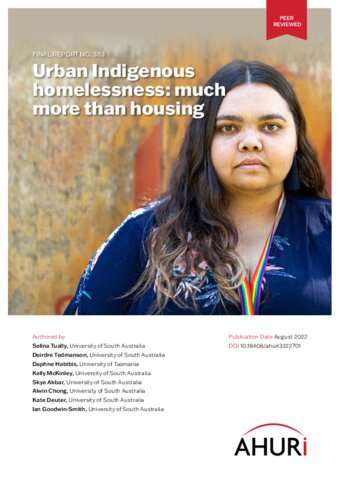Aboriginal homelessness requires a different cultural approach

Aboriginal people are 15 times more likely than other Australians to experience homelessness due to racism, dispossession of land, profound economic disadvantage and cultural oppression, according to a new report released in Canberra today.
But tackling the problem requires a culturally sensitive approach aligned to Aboriginal values focused on safety and understanding, argue the authors of "Urban Indigenous Homelessness: much more than housing."
The report identifies poor literacy, education, criminal histories, domestic violence and lack of sustained tenancies leading to a "revolving door" of homelessness among Aboriginal people in cities.
Authored by Aboriginal and non-Aboriginal researchers from the University of South Australia and University of Tasmania, the Australian Housing and Urban Research Institute commissioned report stresses the need to approach homelessness from an Aboriginal perspective, rather than a western approach.
Lead researcher UniSA Associate Professor Deirdre Tedmanson says a lack of dedicated services for homeless Aboriginal people in urban areas is a serious problem.
"Although structural discrimination, mental illness and poverty can make it difficult for Aboriginal people to access and sustain housing, it is the lack of funding, affordable housing and limited crisis and transitional accommodation that are the real barriers," Assoc. Prof. Tedmanson says.
"Some drivers of homelessness, such as overcrowding, are common issues for Aboriginal communities and can be linked in part to complex and important kinship obligations.
"Western notions of 'home' and 'homelessness' don't necessarily resonate the same way with Aboriginal Australians in regional and remote areas so it's important that responses are culturally informed, culturally appropriate and culturally safe."
Aboriginal women fleeing family violence find it especially hard to manage living away from family support networks, the researchers say, and need support to manage cultural obligations while being protected.
The research calls for new policy and funding strategies which involve direct input from Aboriginal leaders to improve the co-ordination of housing, homelessness and related services in urban communities.
"Support for the wraparound care that Aboriginal community-controlled organizations can provide is critical as self-determination in finding sustainable solutions is the key.
"It's a circular solution. Stable housing improves mental and physical health issues along with substance abuse, and addressing these issues leads to more secure housing. In short, we need more culturally safe accessible social housing for First Nations people," Assoc. Prof. Tedmanson says.
More information: Deirdre Tedmanson et al, Urban Indigenous homelessness: much more than housing, AHURI Final Report (2022). DOI: 10.18408/ahuri3222701
Provided by University of South Australia



















